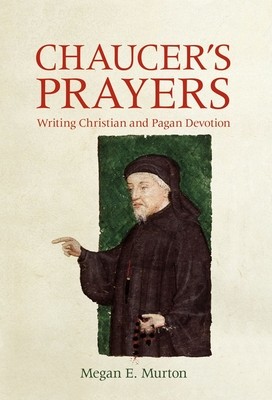
- We will send in 10–14 business days.
- Author: Megan E Murton
- Publisher: Boydell & Brewer
- ISBN-10: 1843845598
- ISBN-13: 9781843845591
- Format: 16 x 23.9 x 1.8 cm, hardcover
- Language: English
- SAVE -10% with code: EXTRA
Reviews
Description
A close examination of the prayers in Chaucer's poetry sheds significant new light on his poetic practice.
In a culture as steeped in communal, scripted acts of prayer as Chaucer's England, a written prayer asks not only to be read, but to be inhabited: its "I" marks a space that readers are invited to occupy. This book examines the implications of accepting that invitation when reading Chaucer's poetry. Both in his often-overlooked pious writings and in his ambitious, innovative pagan narratives, the "I" of prayer provides readers with a subject-position thatcan be at once devotional and literary - a stance before a deity and a stance in relation to a poem. Chaucer uses this uniquely open, participatory "I" to implicate readers in his poetry and to guide their work of reading.In examining Christian and pagan prayers alongside each other, Chaucer's Prayers cuts across an assumed division between the "religious" and "secular" writings within Chaucer's corpus. Rather, it emphasizes continuities andapproaches prayer as part of Chaucer's broader experimentation with literary voice. It also places Chaucer in his devotional context and foregrounds how pious practices intersect with and shape his poetic practices. These insightschallenge a received view of Chaucer as an essentially secular poet and shed new light on his poetry's relationship to religion.
EXTRA 10 % discount with code: EXTRA
The promotion ends in 20d.22:14:19
The discount code is valid when purchasing from 10 €. Discounts do not stack.
- Author: Megan E Murton
- Publisher: Boydell & Brewer
- ISBN-10: 1843845598
- ISBN-13: 9781843845591
- Format: 16 x 23.9 x 1.8 cm, hardcover
- Language: English English
A close examination of the prayers in Chaucer's poetry sheds significant new light on his poetic practice.
In a culture as steeped in communal, scripted acts of prayer as Chaucer's England, a written prayer asks not only to be read, but to be inhabited: its "I" marks a space that readers are invited to occupy. This book examines the implications of accepting that invitation when reading Chaucer's poetry. Both in his often-overlooked pious writings and in his ambitious, innovative pagan narratives, the "I" of prayer provides readers with a subject-position thatcan be at once devotional and literary - a stance before a deity and a stance in relation to a poem. Chaucer uses this uniquely open, participatory "I" to implicate readers in his poetry and to guide their work of reading.In examining Christian and pagan prayers alongside each other, Chaucer's Prayers cuts across an assumed division between the "religious" and "secular" writings within Chaucer's corpus. Rather, it emphasizes continuities andapproaches prayer as part of Chaucer's broader experimentation with literary voice. It also places Chaucer in his devotional context and foregrounds how pious practices intersect with and shape his poetic practices. These insightschallenge a received view of Chaucer as an essentially secular poet and shed new light on his poetry's relationship to religion.


Reviews